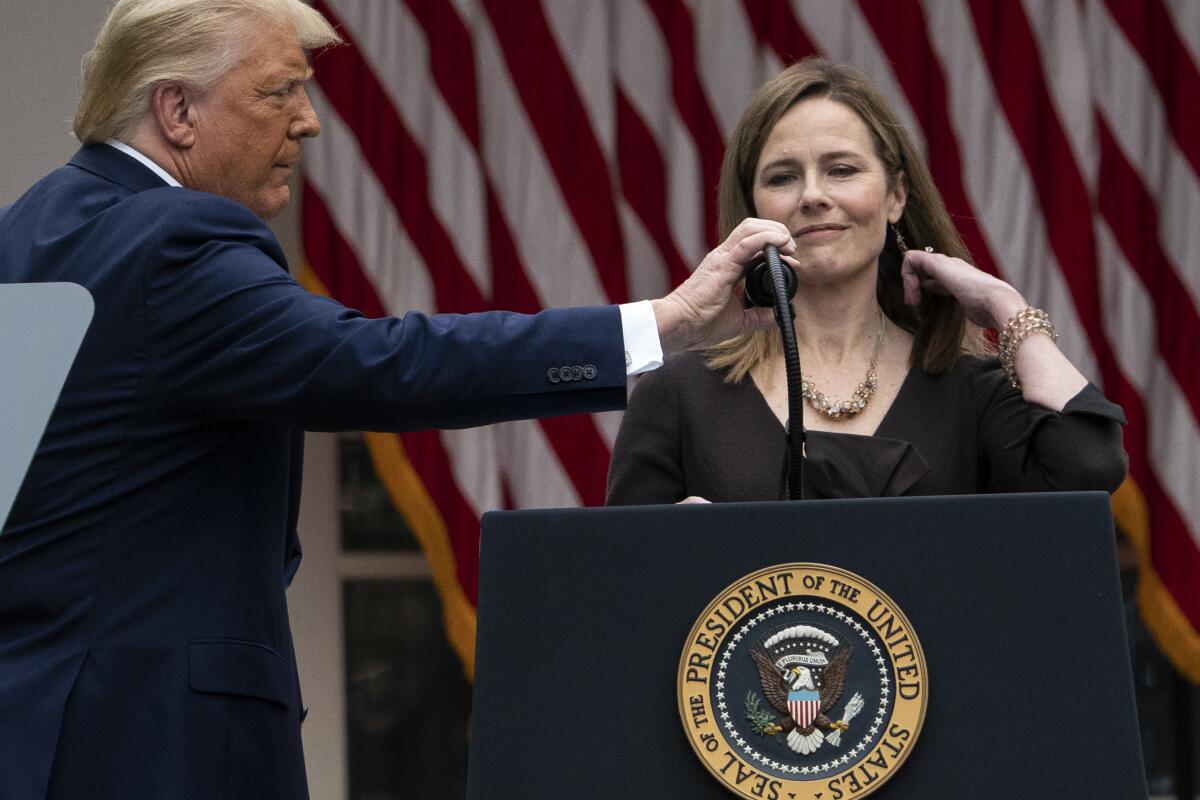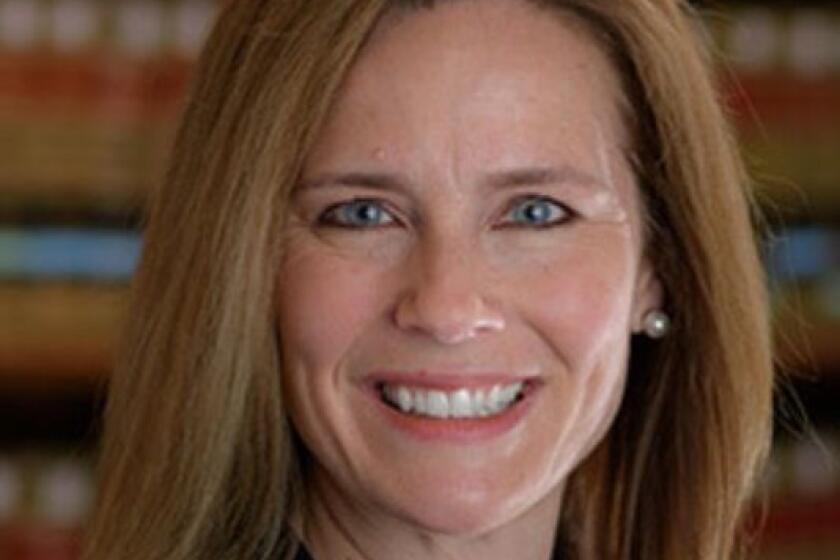Trump Supreme Court nominee Amy Coney Barrett served as a ‘handmaid’ in religious group

WASHINGTON — Supreme Court nominee Amy Coney Barrett served as a “handmaid,” the term then used for high-ranking female leaders in the People of Praise religious community, an old directory for the group’s members shows.
Barrett has thus far refused to discuss her membership in the Christian organization, which opposes abortion and, according to former members, holds that men are divinely ordained as the “head” of both the family and faith, while it is the duty of wives to submit to them.
Portions of two People of Praise directory pages for the South Bend, Ind., branch were shared with the Associated Press by a former member of the community on condition of anonymity because of the sensitivity of the issue and because this person still has family members in People of Praise. A second former member, Gene Stowe, who left the South Bend branch on good terms several years ago, confirmed the authenticity of the directory pages. He said he could not say precisely what year the directory was from but that it had to be 2013 or earlier because one of the people listed had by then moved to another state.
All the top leaders within People of Praise are male, but in each of the group’s 22 regional branches a select group of women is entrusted with mentoring and offering spiritual guidance to other female members. Until recently, these female leaders were called “handmaids,” a reference to Jesus’ mother, Mary, who according to the Bible called herself “the handmaid of the Lord.” The organization recently changed the terminology to “woman leader” because it had newly negative connotations after Margaret Atwood’s dystopian novel “The Handmaid’s Tale” was turned into a popular television show.
The leaders run weekly men’s or women’s groups of about half a dozen people where they pray and talk together, and where the leaders offer advice and guidance. They will also organize to help others in the community, such as providing meals when someone gets sick. Under the organization’s rules, no female leader can provide pastoral supervision to a man, former members said.
Amy Coney Barrett, President Trump’s nominee to fill Ruth Bader Ginsburg’s seat on the Supreme Court, is a hero to many judicial conservatives.
The White House on Wednesday defended Barrett.
“These allegations are offensive and driven by anti-religious bigotry. Judge Barrett is an independent jurist with an exceptional record,” White House spokesman Judd Deere said.
People of Praise’s belief system is rooted in the Catholic Pentecostal movement, which emphasizes a personal relationship with Jesus and can include baptism in the Holy Spirit. As practiced by People of Praise, that can include praying in tongues to receive divine prophecies, heal the sick and cast out evil spirits, according to documents and former members.
Founded in 1971, the nonprofit organization has 22 branches across North America. It is not a church but a faith community that includes people from several Christian denominations, though most of its roughly 1,800 adult members are Roman Catholic.
The existence of the directory listing Barrett’s name as a handmaid was first reported by the Washington Post late Tuesday. The AP reported last week that a 2006 issue of the group’s internal magazine, Vine & Branches, included a photograph showing that Barrett had attended a national conference reserved for top female leaders in People of Praise.
The group had deleted copies of that magazine and other back issues mentioning Barrett and her family from its website in 2017, when her name first emerged on President Trump’s short list for potential nomination to the Supreme Court.
Back issues of the magazine, tax returns and other documents showed Barrett’s father served as the principal leader of People of Praise’s New Orleans branch and was on the group’s all-male Board of Governors as recently as 2017. Her mother also served in the branch as a handmaid.
Other records uncovered this week also showed that both Barrett and her husband, lawyer Jesse M. Barrett, had lived in the home of two of the group’s co-founders while they were young law students at Notre Dame in the 1990s.
Barrett did not disclose her decades-long affiliation with People of Praise on her voluminous Senate judiciary Committee questionnaires filed last month and three years ago, when the Notre Dame law professor was appointed by Trump to a seat on the 7th U.S. Circuit Court of Appeals in Chicago.
Barrett did submit to the Senate her 7th Circuit recusal list of people and companies with which she has a conflict, including her husband, his law firm and Notre Dame University. But the list includes two other South Bend companies: the Healy Group Inc., a financial services firm owned by four People of Praise members, and Great Day LLC, which shares an address and phone number with that firm.
Barrett, 48, did not respond to a telephone message seeking comment. The White House press office did not immediately respond to an email seeking comment about why the mother of seven elected not to disclose her membership in People of Praise to the Senate.
Barrett also did not disclose that she had signed a 2006 newspaper ad sponsored by an anti-abortion group indicating she opposed “abortion on demand” and defended “the right to life from fertilization to the end of natural life.”
On Tuesday, all 10 Democrats on the Senate Judiciary Committee issued a letter asking the Justice Department to explain the omissions and confirm whether any other materials had been left out of Barrett’s Senate questionnaires. If so, the department should immediately provide the materials for committee review, the senators said.
Barrett’s confirmation hearings are set to begin Monday as Republicans rush to approve her ascension to the Supreme Court before the Nov. 3 election.
More to Read
Get the L.A. Times Politics newsletter
Deeply reported insights into legislation, politics and policy from Sacramento, Washington and beyond. In your inbox three times per week.
You may occasionally receive promotional content from the Los Angeles Times.











